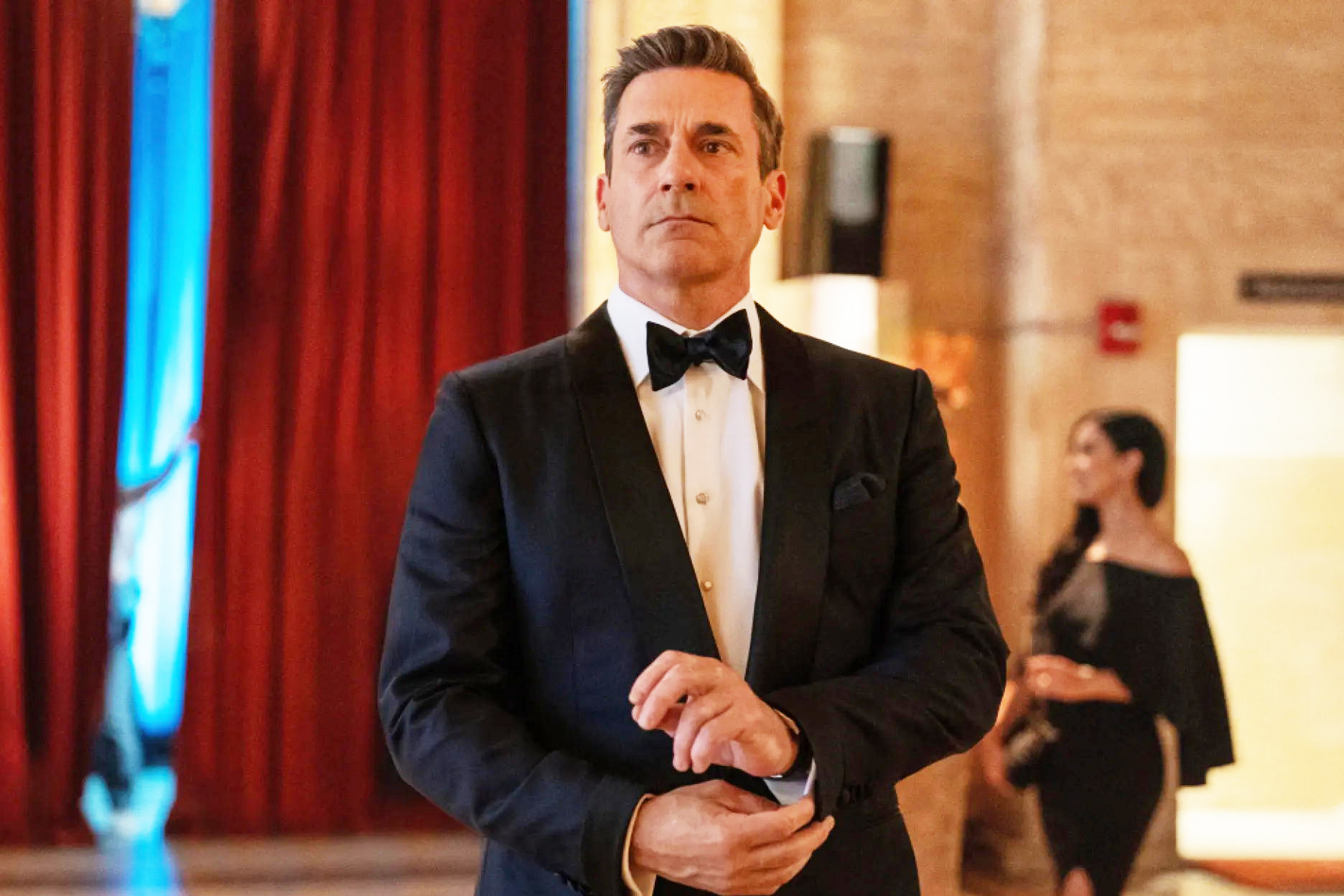Producers who get behind yet another TV series about wealthy Americans and their disconnect from the real world surely know they must offer something more than the scenic indulgences of six-star resorts (White Lotus), private yachts (Succession) and palatial office buildings (Billions).
In Your Friends and Neighbors (Apple TV), the thematic substance is delivered through Andrew Cooper (Jon Hamm), aka Coop, a successful financier whose world is falling apart. He also serves as first-person narrator, reflecting on the philosophical and sociological ironies of his own life as it unfolds (or rather unravels.)
“Viewed from a certain perspective, life boils down to a series of interconnected decisions.” As voiceover, it’s a platitude that comes across as a sharp thematic keynote. Hamm is blessed with one of the most compelling and distinctive voices in the business — deadpan, with a mellow nasal warmth.
Are those interconnected decisions signs of free will or, as we seem to learn by the end of the episode, a form of sociological determinism? Coop is incisive, quick to pick up on the unforeseen circumstances he’s thrown into. It’s as if he’s living a script — being in it, while interpreting what’s happening at one remove.
As he’s blindsided by one situation after another, the distancing effect brings out the stoic in him. “Feels like somebody’s scrambled the whole universe and I’m lost in the shuffle.” You don’t have to be rich to experience that feeling, but maybe it helps if you are. There’s more to lose, though more of what you lose just doesn’t matter.
After he finds his wife Mel (Amanda Peet) in flagrante with her lover in the marital bed, a divorce costs Coop not only his place in the home and family but also most of his wealth, which is tied up in the mortgage and the cost of maintaining two teenage children in the luxuries to which they have become accustomed. Everything is “leveraged.”
That’s only the beginning. Sitting alone in a bar, he’s drawn into a casual fling with a younger woman who states directly that “hothouse sex”’ is on her agenda. But it turns out she works for the same company as he does and may technically be his junior, which gives his treacherous boss an excuse to sack him and take his client list. Things continue to spin out from there.
As Coop finds himself wedged in an impossible financial position, he resorts to crime, in the form of high-end property theft. Here the series has some generic affiliations with Breaking Bad and Better Call Saul, and makes an ironic counterpoint — signalled in its title — to Mister Rodgers’ Neighborhood, the sentimentally idealised local world created by legendary children’s TV presenter Fred Rodgers in the 1960s.
This is not, as Rodgers always announced at the start of his programs, a beautiful day in the neighbourhood. It’s a horrible, no good, very bad day, and those days keep on coming. It’s not just what happens to Coop that causes the dystopic turn, it’s how he’s treated. Or rather, how interactions play out with those he tries to turn to.
There’s complete disconnect in his relationships with his son and daughter; his ex-wife refuses to see the situation in which he’s placed; the temporary love affair looks like sexual exploitation, though not on his part. And his mother “sets the industry standard for terrible parenthood.”
His sister Ali, who has mental health problems and is something of a lost soul herself, is the one redeeming element in the mix. She’s permanently attached to a guitar and breaks out in song, sometimes in inappropriate places, like the front lawn of the man she thought she was going to marry except… that was a road not travelled. She becomes the unlikely rescuer, first of Coop, then of his monosyllabic son Hunter (Donovan Colan), who turns out to have serious talent as a drummer.
Played by music theatre star Lena Hall, Ali is too strong a singer, and altogether too accomplished a performer, to fit the mould of the hippy lost in a time warp, but the character is nevertheless a good move on the part of show-runner Jonathan Tropper. It opens up a lighter side to what might otherwise be a relentlessly cynical storyline and allows Hamm to play to his strengths, which lie just on the edge of comedy.
Much of the humour lies in the quickfire repartee that is the primary mode of communication in close relationships. Everyone here is a psychological profiler, no doubt trained through expensive sessions with personal analysts. They are not sociopaths, but collectively they make up a sociopathic milieu. They are wealthy but not super-rich, a new evolution of the bourgeoisie: profligate, kept in a state of obedience by exorbitant social and financial imperatives.
Their Swiss watches, designer bags, luxury cars, exorbitant club subscriptions — all these are mandatory passports disguised as consumer choices. (Automotive journalist Scotty Reiss has offered a witty psychosocial analysis of the vehicles Coop finds himself driving — from his original status-defining Maserati through a succession of variously acquired service vehicles and battered runabouts.)
Without any spoilers, it can be disclosed that Coop’s adventures include a near-death experience on a murder charge. The murder episode is foreshadowed at the start of the series, no doubt as a hook for viewers who are looking for that sort of thing.
So what does his sorry saga really have to show, aside from its genuine insights into a certain rather over-explored sector of American society? Why this? Why now, as the whole country is juddering under the impact of a political crisis it didn’t foresee and doesn’t understand?
Politics, a national obsession reflected in American television drama since the first season of The West Wing went to air in 1999, hardly gets a mention in Your Friends and Neighbors. But if you’re looking for political insights, very few dramatic renditions, with the exception of Homeland, have anything convincing to offer.
We might have expected some cogent insights from Zero Day, a recent high-profile Netflix series starring Robert de Niro and directed by Lesli Linka Glatter, who also directed episodes of Homeland. With a writing team that includes prominent political journalist Michael S. Schmidt and former president of NBC News Noah Oppenheim, reality-testing should have been assured.
De Niro plays former president George Mullen, an elder statesman whose popular appeal is undimmed. He finds himself back in the spotlight when the current president must declare a state of emergency after a massive cyber-attack shuts down transport systems and other national infrastructure. She and her security team decide that suspending habeas corpus is necessary to assist with hunting down the terrorists. It’s a high-risk measure likely to trigger mass protest, so Mullen is enlisted to front the plan and maintain public support.
Some of Zero Day’s ingredients are oddly prophetic, but it’s misfired prophecy. Angela Bassett as president Evelyn Mitchell might be an evocation of Kamala Harris as the president who was not to be. Mullen, as a Biden figure, is battling with apparent symptoms of dementia. True, the real US president wants to call a state of national emergency and has floated the prospect of suspending habeas corpus. But politically, it’s all back to front and inside out.
What we have here is not political realism but a rerun of a generic American liberal mythology: the president (or former president) with a mind of steel and heart of gold who cares only for The American People, and a crisis in which national faith is shaken but held fast in the moral epicentre of the Oval Office.
The genre runs from The West Wing, takes a detour through Commander in Chief, where Geena David is an independent trying to unite the parties, to Designated Survivor, in which Kiefer Sutherland as president Tom Kirkman has greatness thrust upon him by an explosion at the Capitol building in which the rest of the elected administration is conveniently wiped out.
Even as a fantasy, this genre has well and truly passed its use-by date. It’s the kind of stuff that elicits vitriolic responses from Trump-supporting ideologues like Steve Bannon and Peter Thiel, who assert that self-glorifying liberalism has dominated national culture and taken The American People for a ride. All that saccharine benevolence and moral high-grounding, they claim, was cover for the nefarious agendas of the Deep State.
Given the degree of traction gained by the hard-right counter-myth, it’s hard to understand how and why such a high-powered team should have converged on a series with such weak political moorings. It’s certainly watchable, not least for a strong cast that includes Jesse Plemons as Mullen’s personal assistant and Joan Allen as his wife, but as a whole it lacks momentum and conviction. Sometimes the road not travelled is best left that way. •




